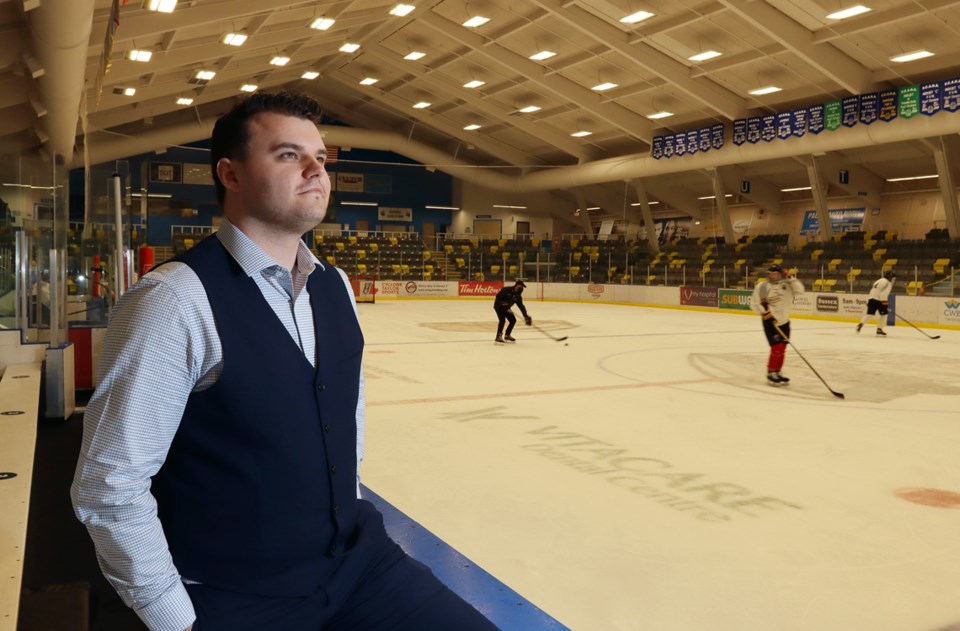Decisions Tali Campbell makes for the Coquitlam Express are often guided by his 10-year-old self.
That’s when the team’s new vice president and general manager was so impressed by players from his hometown team, the Nanaimo Clippers, visiting his Grade 4 classroom at Park Avenue elementary school, he decided he would make hockey his life’s ambition.
Fifteen years later, Campbell is the BC Hockey League’s youngest senior executive after moving over from the Clippers last October. In fact, he’s not much older than the 18- and 19-year-old Express players.
But what some may see as a meteoric rise since Campbell was a volunteer game day coordinator for the Clippers while he was still in high school has actually been a measured extension of his belief in junior hockey as a community builder.
It’s also been somewhat unlikely.
Campbell never played hockey. His mom, who moved the family from Scotland when she divorced his dad, couldn’t afford it, even with support from the local branch of KidSport.
Instead, Campbell played some soccer and then lacrosse.
But when those four Clippers players walked into his classroom to play a little floor hockey and read aloud to the students, Campbell’s passion for hockey came to the fore.
“These guys were like gods,” he said. “That’s where my love for the game started.”
Campbell pestered a teacher in his school who also billeted one of the players for daily updates on the team. He listened to games broadcast on radio. He attended games at Frank Crane arena whenever his mom could afford tickets or some became available through a promotion. When he went off to university in Victoria, he landed a gig as a community relations manager with the BCHL’s Grizzlies, worked his way into sales that eventually led to a 17-month stint as business manager for the Alberni Valley Bulldogs prior to his return to the Clippers.
Campbell said learning about hockey from the ground up has given him an appreciation for every aspect of an organization.
“A lot of times people don’t understand the full-scale approach to putting on a game,” he said. “Whatever needs to be done to make a club successful, I’ll do it.”
Express owner, Fayaz Manji said Campbell’s youth is a unique asset.
“He has a lot of passion and energy,” he said. “He’s able to connect with the players easily and they don’t feel overwhelmed or intimidated when they meet the GM of the team.”
Campbell said having no preconceived notions of how things have always been done has liberated him to forge his own path. Time and again he finds himself dipping back to that first interaction in his Grade 4 classroom.
“Every decision I make is from the heart and that’s where it comes from,” he said.
To help deal with the extraordinary mental health challenges of this most unique season, the Express brought in a mental health coach and each day players are encouraged to check in with each other about their feelings and anxieties.
“It’s gotten rid of that mental health stigma,” said Campbell, who also implemented personal finance seminars for the players and hired an academic advisor to help them navigate post-secondary opportunities..
The end result, Campbell hopes, will be 25 young men who will be better-equipped to handle the future challenges of their lives.
With an eye towards the Express’ 20th anniversary next season, Campbell is also working to rebuild the team’s place in the community, connect with corporate sponsors and keep the volunteers energized. He’s forging new alliances with minor hockey organizations in the Tri-Cities, plotting a calendar of events that will be attended by players or team representatives once public health restrictions ease, as well as making plans for a new dressing room and even a special anniversary jersey.
In a market consumed by the NHL’s Vancouver Canucks, it can be a daunting task, Campbell said.
“We need to make sure we are an active community partner in everything in the community.”



